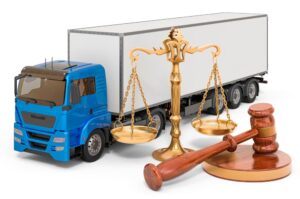Truck drivers and trucking companies have a duty to follow all traffic laws and motor carrier regulations. When they fail to do so, serious accidents and injuries may result. In these cases, accident victims can file a claim with a truck driver or trucking company’s insurer. If the insurance company denies fault for the accident or if they fail to offer sufficient compensation, the accident victim’s lawyer may file a lawsuit in the court system.
Filing a lawsuit begins the litigation process in a truck accident case. However, navigating the court system on your own can be extremely difficult, if not impossible. A skilled Cape Girardeau truck accident attorney in your area can handle every step of the litigation process for you and resolve your case through a settlement, trial, or alternative dispute resolution (ADR) proceeding.
How Do Negligent Truck Drivers and Trucking Companies Cause Accidents?
Truck accidents can be catastrophic, often resulting in severe injuries, fatalities, and extensive property damage. Both negligent truck drivers and trucking companies play significant roles in causing these accidents.
Negligent truck drivers are a primary cause of many truck accidents. One major issue is fatigue. Unrealistic schedules and pressure to meet tight deadlines can push drivers to take risks. Companies may prioritize delivery speed over safety, encourage drivers to violate hours-of-service regulations, skip rest breaks, or speed. Federal regulations limit driving to eleven hours per day, but some drivers ignore these rules to meet deadlines or increase earnings. Fatigue impairs reaction times, judgment, and the ability to stay alert, leading to accidents.
Another factor is distracted driving. Truck drivers may use their phones, eat, or engage in other distractions while driving. Given the size and weight of trucks, even a momentary lapse in attention can result in a devastating collision. Speeding is also a common problem. Trucks need more time and distance to stop compared to smaller vehicles. When drivers exceed speed limits or drive too fast for road conditions, they increase the likelihood of losing control or being unable to stop in time to avoid a crash.
Impaired driving is another serious issue. Some truck drivers use alcohol or drugs to cope with the stress and monotony of long hauls. Impairment reduces a driver’s ability to operate the vehicle safely, leading to erratic driving, poor decision-making, and slower reaction times.
Trucking companies can also contribute to accidents through negligence. Poor maintenance is a significant factor. Trucks require regular inspections and maintenance to ensure they are safe to operate. Some companies cut corners on maintenance to save money, resulting in trucks with faulty brakes, worn tires, or other mechanical issues that can cause accidents.
Inadequate training is another issue. Trucking companies have a responsibility to ensure their drivers are well-trained and competent. However, some companies may not provide sufficient training, leading to drivers who are unprepared for the challenges of operating large commercial vehicles.
What Elements Do You Need to Prove in a Truck Accident Lawsuit?
Proving a truck accident lawsuit requires establishing several key elements: duty of care, breach of duty, causation, and damages. Here is a breakdown of each element and how to prove them.
- Duty of Care — First, you must prove that the truck driver or trucking company owed you a duty of care. This means they had a legal responsibility to act in a way that would not harm others. Truck drivers have a duty to operate their vehicles safely and follow traffic laws. Trucking companies have a duty to maintain their trucks and ensure their drivers are properly trained and rested.
- Breach of Duty — Next, you need to demonstrate that the truck driver or company breached this duty. A breach occurs when they fail to act as a reasonable person would under similar circumstances. Examples include a truck driver’s speeding, driving while distracted, or violating hours-of-service regulations. For trucking companies, a breach can involve neglecting maintenance or failing to conduct proper background checks on drivers. Evidence such as traffic citations, witness statements, and maintenance records can help prove this breach.
- Causation — Causation is the link between the breach of duty and the accident. You must show that the truck driver’s or company’s negligence directly caused the accident and your injuries. This can be established through evidence such as accident reports, expert testimony, and video footage. For instance, an accident reconstruction expert can analyze the crash scene to determine how the driver’s actions led to the collision.
- Damages — Finally, you must prove that you suffered damages as a result of the accident. Damages can be physical, emotional, or financial. Medical records, bills, and testimony from healthcare providers can demonstrate physical injuries. Pay stubs and employment records can show lost income if you missed work. Furthermore, you may need to provide evidence of property damage to your vehicle and other personal items.
To successfully prove these elements, thorough evidence collection is crucial. Gather all relevant documents, such as police reports, medical records, and repair estimates. Take photographs of the accident scene, your injuries, and any property damage. Witnesses can provide valuable statements, so obtain their contact information if possible.
By carefully collecting and presenting evidence, you and your truck accident attorney can build a strong case to support your claims.
What Are the Steps for Filing a Truck Accident Lawsuit?
Filing a truck accident lawsuit involves several steps and navigating through the litigation process. The following is an overview of what is involved:
- Initial Consultation — The process begins with consulting a personal injury lawyer experienced in truck accident cases. During this initial meeting, you will discuss the details of the accident, injuries sustained, and potential legal options. The lawyer will assess the strength of your case and explain your rights and the legal process ahead.
- Investigation and Evidence Gathering — After deciding to proceed with the lawsuit, your lawyer will conduct a thorough investigation. This includes gathering evidence such as police reports, witness statements, photos of the accident scene, and any available video footage. They may also review medical records to understand the extent of your injuries.
- Filing a Complaint — The next step is formally filing the lawsuit, which begins by drafting and submitting a complaint to the appropriate court. This document outlines your allegations against the truck driver and/or trucking company, detailing the negligence and damages you are claiming.
- Discovery Process— Once your attorney files the lawsuit, both sides engage in the discovery process. This involves exchanging information and evidence relevant to the case. Discovery methods include written interrogatories (questions each party must answer under oath), requests for the production of documents, and depositions (sworn testimony given out of court).
- Pretrial Motions and Settlement Negotiations — During the pretrial phase, either party may file motions with the court to resolve certain legal issues or disputes. Meanwhile, settlement negotiations may occur between your lawyer and the defense to try to reach a resolution without going to trial. If the parties can reach a fair settlement, the case will be resolved at this stage.
- Trial — If the parties cannot reach a settlement, the case proceeds to trial. During the trial, both sides present their arguments, evidence, and witnesses to a judge and/or jury. Your lawyer will advocate on your behalf, aiming to prove the accused’s (defendant’s) negligence and the extent of your damages. The opposing side will defend against your claims.
- Judgment and Appeal — After both sides have presented all evidence and the court has heard all arguments, the judge or jury deliberates and delivers a judgment. If you win, the court will determine the amount of compensation you are entitled to receive. If either party disagrees with the outcome, they may appeal the decision to a higher court, which reviews the case for legal errors.
Throughout this process, your lawyer will guide you, advocate for your interests, and keep you informed about all new developments.
What Are the Most Common Injuries in a Truck Crash?
Truck accidents often result in serious injuries due to the size and weight disparity between trucks and smaller vehicles. When negligence on the part of truck drivers or trucking companies is involved, several common injuries can occur:
- Whiplash and Neck Injuries — Whiplash is a frequent injury in truck accidents, especially in rear-end collisions. The forceful back-and-forth motion of the head and neck can strain muscles, ligaments, and tendons, leading to pain and stiffness. In severe cases, whiplash can cause herniated discs or nerve damage.
- Back Injuries — The impact of a truck accident can cause back injuries such as sprains, strains, and herniated discs. These injuries can result in chronic pain and limited mobility and sometimes require surgery for treatment.
- Head and Brain Injuries — Head injuries range from concussions to traumatic brain injuries (TBIs), which can have long-term consequences. Even with a seatbelt, occupants in smaller vehicles can sustain head injuries from the impact of a truck collision or from being ejected.
- Spinal Cord Injuries — Truck accidents can cause spinal cord injuries, which may result in partial or complete paralysis. These injuries are often catastrophic, requiring extensive medical treatment, rehabilitation, and lifelong care.
- Fractures and Crush Injuries — Fractures are common in truck accidents due to the forces involved. Limbs can be crushed between vehicles or against the interior of the vehicle, leading to severe fractures or even requiring amputation in extreme cases.
- Internal Injuries — Blunt force trauma from a truck collision can cause internal injuries such as organ damage, internal bleeding, or collapsed lungs. These injuries may not be immediately apparent and can be life-threatening if not promptly treated.
- Psychological Injuries — In addition to physical injuries, truck accidents can also cause psychological trauma, such as post-traumatic stress disorder (PTSD), anxiety, and depression. Witnessing or experiencing a traumatic event like a truck accident can have lasting emotional effects on survivors.
How Much Is a Truck Accident Claim or Lawsuit Worth?
Determining the worth of a truck accident claim or lawsuit involves considering various factors, including the severity of injuries, economic losses, and the effects on the victim’s life. The following is an overview of how compensation is assessed and the types of damages accident victims can recover:
Economic Damages
Economic damages refer to tangible financial losses incurred as a direct result of the accident. This includes:
- Medical Expenses — Costs for hospitalization, surgeries, doctor visits, medications, rehabilitation, and future medical care related to the injuries sustained in the accident
- Lost Earnings — Compensation for income lost due to inability to work during recovery, including both current lost income and potential future earnings if the injuries result in long-term or permanent disability
- Property Damage — Repair or replacement costs for vehicles and other personal property damaged in the accident.
Non-economic Damages
Non-economic damages compensate for intangible losses that are more difficult to quantify. This includes:
- Pain and Suffering — Compensation for physical pain and emotional distress due to the injuries sustained in the accident, including discomfort, anxiety, depression, and loss of enjoyment of life
- Loss of Consortium — These damages are awarded to compensate for the repercussions of the injuries on relationships with family members, particularly spouses.
Punitive Damages
In cases where the defendant’s conduct is particularly reckless or egregious, the court may award the victim punitive damages. These damages are intended to punish the defendant and deter similar conduct in the future.
Factors Affecting Claim Value
The value of a truck accident claim depends on several factors:
- Severity of Injury — More severe injuries typically result in higher compensation, especially if they lead to permanent disability or disfigurement.
- Liability — Clear evidence of the truck driver’s or company’s negligence strengthens the claim, potentially increasing the compensation amount.
- Insurance Coverage — The limits of insurance policies held by the trucking company and other parties involved can affect the maximum amount recoverable.
- Jurisdictional Factors — Laws governing personal injury cases vary by state, influencing the calculation of damages and the legal procedures involved.
To determine the potential value of a claim, it is essential to consult with a qualified truck accident attorney who can evaluate the specifics of the case and advocate for fair compensation. Attorneys use their experience in handling similar cases and knowledge of relevant laws to negotiate settlements or litigate in court, aiming to secure adequate compensation that covers all losses and damages you have suffered.
Call an Experienced Truck Accident Lawyer Today
If you recently suffered injuries in a truck accident that a negligent truck driver or trucking company caused, a skilled personal injury lawyer can file a timely claim or lawsuit in your case. Throughout the process, your attorney can negotiate on your behalf or litigate your case through the court system to achieve a favorable resolution.






